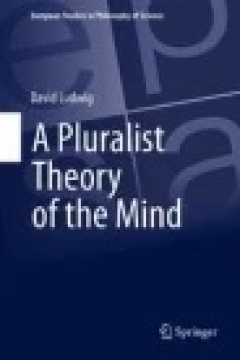Filter by

Epistemology and Political Philosophy in Gilbert Simondon Individuation, Tec…
This combination of historiography and theory offers the growing Anglophone readership interested in the ideas of Gilbert Simondon a thorough and unprecedented survey of the French philosopher’s entire oeuvre. The publication, which breaks new ground in its thoroughness and breadth of analysis, systematically traces the interconnections between Simondon’s philosophy of science and technolog…
- Edition
- -
- ISBN/ISSN
- 978-94-017-9831-0
- Collation
- XI, 251
- Series Title
- -
- Call Number
- -

Epistemological Dimensions of Evolutionary Psychology
As psychology and philosophy arose as answers to the eternal question of how the mind works, evolutionary psychology has gained ground over recent years as a link between cognitive-behavioral and natural-science theories of the mind. This provocative field has also gathered a wide range of criticisms, from attributing too much autonomy to the brain to basing itself on faulty assu…
- Edition
- -
- ISBN/ISSN
- 978-1-4939-1387-9
- Collation
- 9 b/w illustrations, 6 illustrations in colour
- Series Title
- -
- Call Number
- -

Academic Barbarism, Universities and Inequality
The image of the university is tarnished: this book examines how recent philosophies of education, new readings of its economics, new technologies affecting research and access, and contemporary novelists' representations of university life all describe a global university that has given up on its promise of greater educational equality.
- Edition
- Ed. 1
- ISBN/ISSN
- 978-1-137-54761-3
- Collation
- X, 175
- Series Title
- Palgrave Critical University Studies
- Call Number
- 378 OSU a

A Treatise of Legal Philosophy and General Jurisprudence: Volume 6: A History…
The first-ever multivolume treatment of the issues in legal philosophy and general jurisprudence, from both a theoretical and a historical perspective. The work is aimed at jurists as well as legal and practical philosophers. Edited by the renowned theorist Enrico Pattaro and his team, this book is a classical reference work that would be of great interest to legal and practical philosophers as…
- Edition
- -
- ISBN/ISSN
- 978-94-017-9885-3
- Collation
- XXVIII, 444
- Series Title
- -
- Call Number
- 340 TRE t

A Student's Guide Through the Great Physics Texts: Volume II: Space, Time and…
This book provides a chronological introduction to the science of motion and rest based on the reading and analysis of significant portions of Galileo’s Dialogues Concerning Two New Sciences, Pascal’s Treatise on the Equilibrium of Fluids and the Weight of the Mass of Air, Newton’s Mathematical Principles of Natural Philosophy, and Einstein’s Relativity. Each chapter begins with a sh…
- Edition
- Ed. 1
- ISBN/ISSN
- 978-1-4939-1366-4
- Collation
- XXVI, 380
- Series Title
- Undergraduate Lecture Notes in Physics
- Call Number
- 501 KUE s

A Student's Guide Through the Great Physics Texts: Volume I: The Heavens and …
This book provides a chronological introduction to the sciences of astronomy and cosmology based on the reading and analysis of significant selections from classic texts, such as Ptolemy’s The Almagest, Kepler’s Epitome of Copernican Astronomy, Shapley’s Galaxies and Lemaître’s The Primeval Atom. Each chapter begins with a short introduction followed by a reading selection. Carefull…
- Edition
- Ed. 1
- ISBN/ISSN
- 978-1-4939-1360-2
- Collation
- XXVII, 396
- Series Title
- Undergraduate Lecture Notes in Physics
- Call Number
- 501 KUE s

Raw Data: A Novel on Life in Science
Chloe and Karen are ambitious and independent-minded young scientists, both trying to make their mark in the competitive world of biomedical science. They work in Tom Palmer’s lab at a top-tier research institute in the US. Life in the lab is full of excitement and passion, but also frustrations, jealousy and the fear of being scooped. When honesty and scientific integrity are questioned in …
- Edition
- -
- ISBN/ISSN
- 978-3-319-23974-3
- Collation
- -
- Series Title
- -
- Call Number
- 101

A Pluralist Theory of the Mind
This book challenges common debates in philosophy of mind by questioning the framework of placement problems in contemporary metaphysics. The author argues that placement problems arise when exactly one fundamental ontology serves as the base for all entities, and will propose a pluralist alternative that takes the diversity of our conceptual resources and ontologies seriously. This general plu…
- Edition
- Ed. 1
- ISBN/ISSN
- 978-3-319-22738-2
- Collation
- -
- Series Title
- European Studies in Philosophy of Science
- Call Number
- 530.01 LUD p

A Philosophy of Israel Education: A Relational Approach
This book develops a new philosophy of Israel education. “Person-centered” Israel education is concerned with developing in individual learners the ability to understand and make rational, emotional, and ethical decisions about Israel, and about the challenges Israel regularly faces, whether they be existential, spiritual, democratic, humanitarian, national, etc. Chazan begins by laying out…
- Edition
- Ed. 1
- ISBN/ISSN
- 978-3-319-30779-4
- Collation
- -
- Series Title
- -
- Call Number
- 200.11 CHA p

A History of Western Public Law: Between Nation and State
The book outlines the historical development of Public Law and the state from ancient times to the modern day, offering an account of relevant events in parallel with a general historical background, establishing and explaining the relationships between political, religious, and economic events.
- Edition
- Ed. 1
- ISBN/ISSN
- 978-3-319-11803-1
- Collation
- -
- Series Title
- -
- Call Number
- 340.1 AGU h
 Computer Science, Information & General Works
Computer Science, Information & General Works  Philosophy & Psychology
Philosophy & Psychology  Religion
Religion  Social Sciences
Social Sciences  Language
Language  Pure Science
Pure Science  Applied Sciences
Applied Sciences  Art & Recreation
Art & Recreation  Literature
Literature  History & Geography
History & Geography